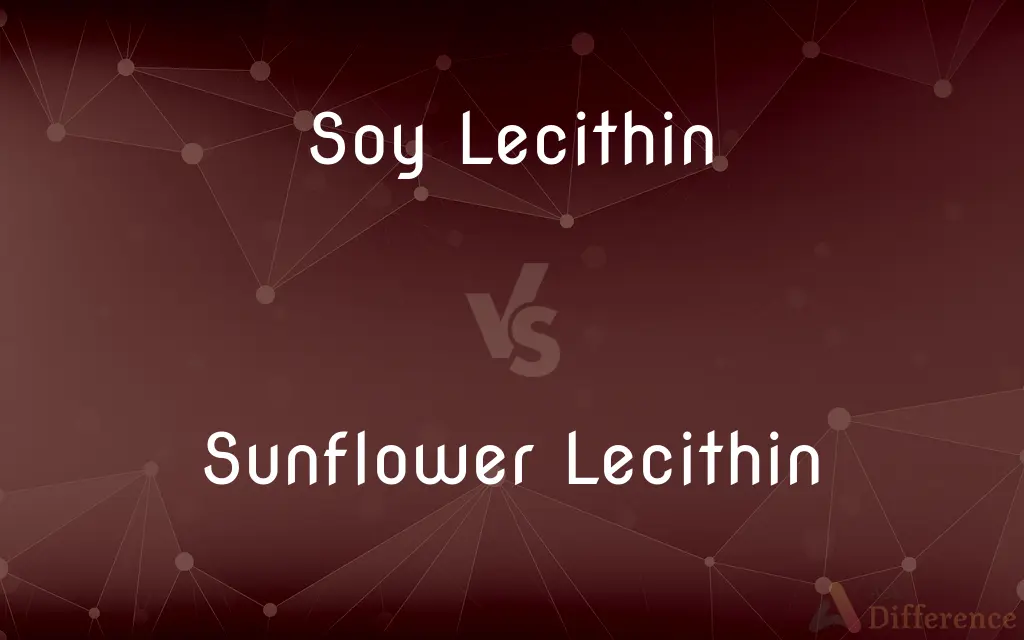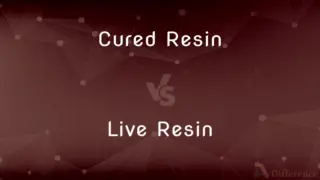Soy Lecithin vs. Sunflower Lecithin — What's the Difference?
By Tayyaba Rehman — Published on December 22, 2023
Soy Lecithin is derived from soybeans, often a byproduct of soy oil processing, while Sunflower Lecithin is extracted from sunflower seeds and is often preferred due to allergen concerns.

Difference Between Soy Lecithin and Sunflower Lecithin
Table of Contents
ADVERTISEMENT
Key Differences
Soy Lecithin and Sunflower Lecithin are both natural emulsifiers, widely utilized in food and pharmaceutical industries. While both share the primary function of mixing water and oil-based ingredients, their sources and processing methods differ.
Extracted from soybeans, Soy Lecithin often emerges as a byproduct during soy oil production. It is incredibly popular, thanks to its efficacy and the abundance of soybeans. In contrast, Sunflower Lecithin is derived directly from sunflower seeds, providing a plant-based alternative without the potential allergens associated with soy.
A notable distinction between Soy Lecithin and Sunflower Lecithin lies in their extraction methods. While the former is typically extracted using chemical solvents, the latter often employs a cold-pressing method, which many believe retains more of the beneficial nutrients and makes it a cleaner option.
From a nutritional standpoint, both emulsifiers offer essential phospholipids that support cellular health. However, Sunflower Lecithin, thanks to its cold-pressing extraction, might have a slight edge in preserving these nutrients. Conversely, Soy Lecithin's widespread use is primarily driven by its cost-effectiveness and abundant supply.
While both are generally considered safe for consumption, Soy Lecithin might pose allergen concerns for those sensitive to soy products. Sunflower Lecithin, being soy-free, emerges as a preferred choice for individuals with soy allergies or those looking for non-soy alternatives.
ADVERTISEMENT
Comparison Chart
Source
Soybeans
Sunflower seeds
Extraction Method
Often uses chemical solvents
Typically cold-pressed
Allergen Concerns
Potential allergen (soy)
Soy-free, less allergenic
Nutritional Benefits
Provides essential phospholipids
Might retain more nutrients due to extraction
Popularity & Cost
More common and cost-effective
Rising in popularity, may be pricier
Compare with Definitions
Soy Lecithin
Contains essential phospholipids beneficial for cellular health.
Supplements often include Soy Lecithin for its health benefits.
Sunflower Lecithin
A natural emulsifier extracted from sunflower seeds.
Sunflower Lecithin is gaining traction in natural food products.
Soy Lecithin
Often a byproduct of soy oil processing.
After extracting oil from soybeans, the residual matter often contains Soy Lecithin.
Sunflower Lecithin
Generally considered a cleaner option due to extraction methods.
Health enthusiasts often lean towards Sunflower Lecithin because of its clean processing.
Soy Lecithin
A substance that helps mix water and oil-based ingredients.
In salad dressings, Soy Lecithin ensures that the oil and vinegar combine smoothly.
Sunflower Lecithin
A preferred alternative for those with soy allergies.
For those avoiding soy, Sunflower Lecithin becomes an ideal ingredient choice.
Soy Lecithin
Potential allergen for those sensitive to soy.
Some individuals prefer to avoid Soy Lecithin due to soy allergies.
Sunflower Lecithin
Contains phospholipids essential for cellular functions.
Sunflower Lecithin's nutritional profile makes it a favorite in health supplements.
Soy Lecithin
A natural emulsifier derived from soybeans.
Soy Lecithin is commonly found in chocolates to maintain consistency.
Sunflower Lecithin
Often obtained using cold-pressing extraction methods.
The cold-pressed method ensures Sunflower Lecithin retains its nutritional properties.
Common Curiosities
Are there cost differences between the two?
Soy Lecithin is generally more cost-effective due to its abundant supply, while Sunflower Lecithin may be pricier.
Are there significant nutritional differences between the two?
Both offer essential phospholipids, but Sunflower Lecithin might retain more nutrients due to cold-pressing extraction.
Can I use Sunflower Lecithin as a direct replacement for Soy Lecithin in recipes?
Yes, Sunflower Lecithin can often replace Soy Lecithin in equal quantities.
Why might someone prefer Sunflower Lecithin over Soy Lecithin?
Sunflower Lecithin is soy-free, making it suitable for those with soy allergies or seeking cleaner processing methods.
Is one considered more "natural" than the other?
Both are natural, but Sunflower Lecithin's cold-pressed extraction is often viewed as cleaner.
Can I find products that are free of both?
Yes, there are alternative emulsifiers available, though these two are among the most common.
Can I take them as health supplements?
Yes, both Soy Lecithin and Sunflower Lecithin are available as health supplements.
What is Soy Lecithin commonly used for?
Soy Lecithin is widely used as an emulsifier in food products and supplements.
Are there any allergen concerns with Sunflower Lecithin?
While it's soy-free, those with sunflower allergies should be cautious.
How do these emulsifiers benefit the body?
They provide essential phospholipids that support cellular health and functions.
Do they taste different?
While both are mild in flavor, Sunflower Lecithin might have a slightly nuttier taste compared to Soy Lecithin.
Are there GMO concerns with Soy Lecithin?
Some Soy Lecithin might be derived from GMO soybeans, so it's essential to check the product source.
Why is Soy Lecithin so widespread in products?
Its efficacy, cost-effectiveness, and abundant soybean supply make Soy Lecithin a popular choice.
Are there any side effects associated with either?
Both are generally considered safe, but individuals with allergies or sensitivities should consult their physician.
Is one more environmentally friendly than the other?
Both have environmental impacts related to their sourcing and processing, so it's best to look for sustainably-produced options.
Share Your Discovery

Previous Comparison
Cured Resin vs. Live Resin
Next Comparison
Steel vs. Stainless SteelAuthor Spotlight
Written by
Tayyaba RehmanTayyaba Rehman is a distinguished writer, currently serving as a primary contributor to askdifference.com. As a researcher in semantics and etymology, Tayyaba's passion for the complexity of languages and their distinctions has found a perfect home on the platform. Tayyaba delves into the intricacies of language, distinguishing between commonly confused words and phrases, thereby providing clarity for readers worldwide.
















































